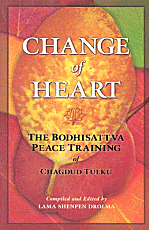Chagdud Tulku (1930 - 2002) was a Tibetan meditation master who taught extensively in the East and West. During the last 14 years of his life, he gave the Bodhisattva Peace Training to individuals around the world. This paperback, complied and edited by one of his students, Lama Shenpen Drolma, is organized around these teachings on change of heart. It is an eminently practical book with 28 meditations and lots of question-and-answer sessions with Chagdud Tulku where he addresses basic Buddhist concerns.
This Tibetan spiritual teacher observes: "In Tibetan Buddhism, the peacock symbolizes the bodhisattva. A peacock is said to eat poisonous plants, transforming their toxins into the radiant colors of its feathers. It does not poison itself. In the same way, we who advocate peace must not poison ourselves with anger but regard with equanimity those who perpetrate violence, remaining constantly aware of our own state of mind. If we become angry in our efforts, we must pull back and regain our compassionate perspective. Without anger, perhaps we will penetrate the terrible delusion that gives rise to violence and hellish suffering." The way of peace is not an easy one, and this teaching makes it clear how we must always guard our mind against the poisons of anger and its brothers and sisters — ignorance, desire, jealousy, and pride.
According to Chagdud Tulku, good heart is the medicine that heals all conflict and is the antidote to selfishness. Here is a practice that is part of the bodhisattva peace training on reducing our attachment: "Take something you value — gold, silver, jewelry — and hold it in your right hand; then give it to the left, saying 'I'm giving this up,' Then offer it back to the right hand. From one hand to the other, repeatedly give it away. It may sound simplistic, but in this small, humorous way, we can begin to break down the habit of holding on to things. We mentally practice giving them up again and again until our grip loosens."
The practice of equanimity is another way to combat selfishness and our need to always put one thing over another and to divide the world into good and bad, worthwhile and insignificant. Discussing anger, Chagdud Tulku says: "If your anger makes you realize you need to develop patience, that is useful. And if, as anger arises, you recognize its true nature as mirrorlike wisdom, that is also beneficial. From the point of view of spiritual practice, someone inciting our anger benefits us because, to attain enlightenment, we must develop patience. We can't do that without some kind of provocation — something or someone who forces us to be patient. If, through love and compassion, you can transform your anger, you will inspire and benefit those around you."
As you can see by now, Change of Heart is filled with pragmatic and down-to-earth insights, meditations, and spiritual practices on peace training. There are also fine treatments of rejoicing in the good fortune of others, fighting attachment, contemplating karma, dealing with impermanence, and nourishing the radiant heart. Chagdud Tulky concludes with a two-page spread on "Daily Life as a Spiritual Path" that is rich with ways to make the most of every moment.
